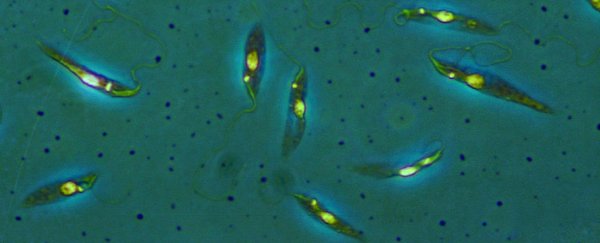A new study has discovered a new species of parasite living in Australia, which shares an evolutionary ancestor to a terrifying group of 'flesh-eating' parasites.
The new parasite - Zelonia australiensis has recently been discovered in an Australian black fly species that bites mammals – including humans.
Joel Barratt, a parasite expert at the University of Technology Sydney (UTS), and the lead researcher behind the new discovery, says that although this species probably doesn't eat flesh, the finding shows that scientists need to be more aware of similar tropical diseases emerging in the region.
"In conjunction with previous research, this study provides clues as to what these parasites are capable of. They have invaded new lands in the past, adapting to infect new species," he said.
"This raises an important question: do human activities provide an increasing opportunity for human-infecting species to take up residence on Australian soil? We know this has happened for other parasites in various places. The spread of malaria from Africa to Europe and the Americas is a prime example."
The discovery has coincided with a rise in cases of the flesh-eating version of the parasite - called Leishmania - in Australia and around the world over the past few decades. This has also increased the disease caused by the parasite – leishmaniasis.
"With more international tourism and migration of refugees from endemic regions, leishmaniasis has emerged as an increasingly imported infection within Australia," said one of the researchers, Damien Stark, from the St Vincent's Hospital.
"So far no cases of local transmission have been reported and it was thought Australia lacked an insect vector that might be capable of transmitting Leishmania. Our research shows that may not be the case."
The researchers say that understanding this new parasite and the evolution of the species as a whole may give them more information on the transmission of Leishmania.
"Understanding these evolutionary relationships helps us tease out the events that led these parasites to go from infecting only insects to eventually infecting humans," said Barratt.
"[It] helps us recognise how adaptable life is, allowing us to mitigate future risks."
According to the researchers, Australia in general is not very well equipped to deal with a range of tropical diseases, such as Dengue, Zika virus, Japanese encephalitis, Chikungunya, SARS, MERS, and Ebola, which could all cause outbreaks.
One part of the solution proposed by the researchers could be creating an Australian version of the American Centre for Disease Control (CDC). This is not the first time this recommendation has been put forward either, with a 2013 committee finding the same thing.
"The lack of action is concerning – we must remain vigilant and play a role in the surveillance, research and prevention of these infectious diseases," said Stark.
We couldn't agree more.
The research has been published in PLOS Neglected Tropical Diseases.
UTS Science is a sponsor of ScienceAlert. Find out more about their research.
